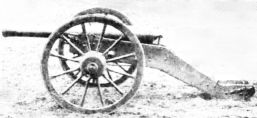New Boston Historical Society
New Boston, New Hampshire
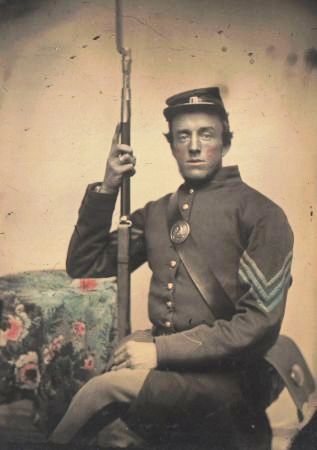
Sgt. Jacob Langdell
Civil War: New Boston Men in the War of Rebellion
The New Boston town cemetery contains many gravestones of veterans of the American Civil War (1861-1865).
These are marked with star-shaped flag holders labeled "G.A.R." for the "Grand Army of the Republic".
The 1885 "History of Hillsborough County" lists 86 New Boston men who volunteered to serve in the War of Rebellion
and indicates that 29 of them - one third of the volunteers - died in service.
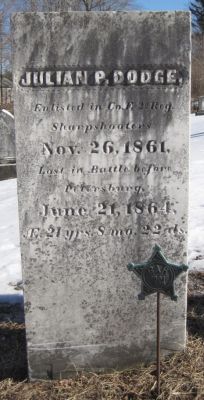
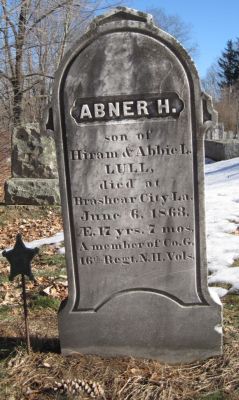
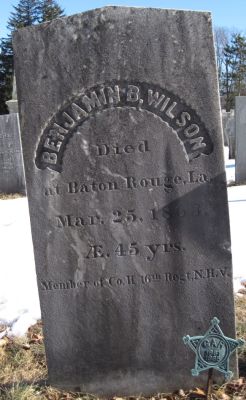
Three of the gravestones in New Boston town cemetery with G.A.R. flag holders
Jacob Langdell, the soldier in the photograph at the top of this page, is one of the fortunate men who survived the war.
Here is an excerpt from one of Jacob's letters home:
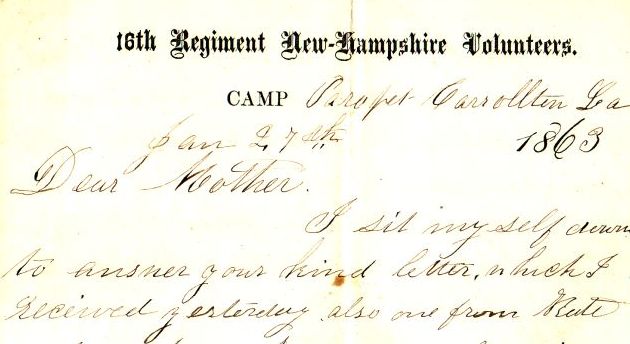
Jan 27th 1863
Dear Mother,
I sit myself down to answer your kind letter, which I received yesterday, also one from Nate and one from Ada, and also six newspapers, and I have had reading enough today I shall have to talk to you for not writing longer letters but am glad to get any kind.
I am in the Hospt. but Mother dont worry about me because I am at the Hospt. for I dont call this a bad place at all. I should rather be here than to be on the boat. I am getting along first rate but I am going to stay here untill I feel pretty well when I first came here I did not have any appetite but I begin to have now our living here at the hospt.
I [have] gruel flour bread and soup and rice and I have had some dried apple sauce twice and that tasted real good. I toast my bread. I get some butter down to the store we have to pay 45 cents per pound I dont get much at a time nor very often either chees is 25 cts per pound I don't see what makes things so high here I don't buy so much stuff as I did when I first came here for we live better and don't kneed too
I guess you have got some snow at New Boston by this time by the feeling of the air here. I should like to see Charlie & Johnnie but if I live and prosper I shall be at home before many months. I am contented for I know that the same Providence watches over me here that does you at the north.
This in haste from your son Jacob Langdell N.H. Vol.
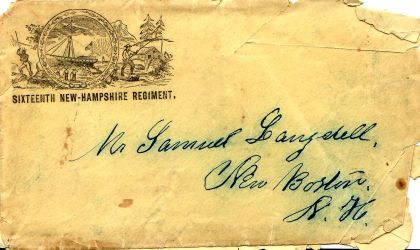
Who were the men who answered President Lincoln's call for volunteers? We know their names, and we have photographs of a few of them. The "carte de visite" was just becoming popular as the war began. This was a small photograph the size of a visiting card, and soldiers about to go off to war liked to have their pictures taken for their loved ones. Enterprising photographers like John Morgan would set up a photo studio at encampments like Concord where New Hampshire's volunteers assembled to "muster in" after enlisting. Jacob Langell's photo above was scanned from a hand-colored glass plate, but here are three photos from cartes des visites:
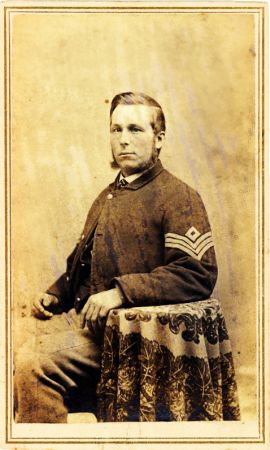
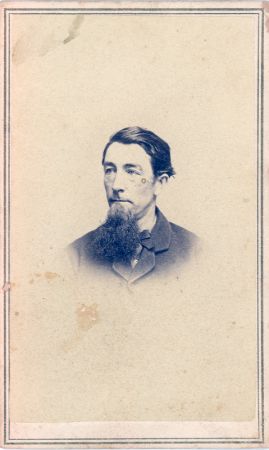
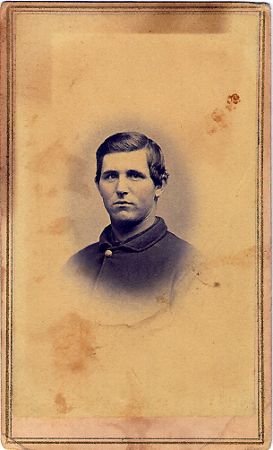
From left to right: Solomon Dodge III (1836 - 1928), William B. Dodge (1840 - 1911) and Julian P. Dodge (1842 - 1864)
Photos from www.dodgefamily.org
Julian P. Dodge was one of two New Boston men who served in Company F of the 2nd U.S. Sharpshooters or "Berdan's Sharpshooters".
Colonel Hiram Berdan selected only the finest marksmen of the North to serve in his units. To qualify for Berdan's Sharpshooters, a candidate needed to fire ten consecutive shots into a ten-inch circle at a distance of 200 yards. On the field of battle, the Sharpshooters' military targets were enemy officers and cannoneers. Berdan's men wore forest green coats, and sometimes had black ostrich feathers in their green caps.
Julian enlisted for three years at age 19 in November 1861, was wounded in battle in 1862 and 1864, and was killed June 22, 1864 at Weldon Railroad, Virginia. He was 22 years old. His gravestone is shown near the top of this page.
Another New Boston man in Company F of the 2nd U.S. Sharpshooters was William C. Beard (no photo available).
William enlisted in September 1861 at age 20, was wounded in September 1862 at Antietam, and was killed July 4, 1863 at the Battle of Gettysburg, two months before his 23rd birthday.
Col. Berdan's report on the Battle of Gettysburg includes:
On the morning of the 4th [of July], the Second Regiment was deployed in the field in front of our position on the 3d, and advanced, driving the enemy's skirmishers to the edge of the woods, which position they held until relieved at 7.30 p.m. by a New Jersey regiment, having been under heavy picket firing all day.
The entire command, with very few exceptions, behaved most gallantly.
We went into action with about 450 rifles. During the three days, we expended 14,400 rounds of ammunition.
Our total loss was:
Commissioned officers: 2 killed 7 wounded 1 missing 10 total
Enlisted men: 10 killed 52 wounded 17 missing 79 total
Note: The Battle of Gettysburg had the largest number of casualties of any engagement in the Civil War.
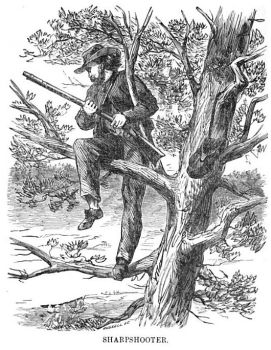
Sharpshooter from 1870 book
"New Hampshire in the Great Rebellion"
12 Short Stories
of New Boston in the Civil War
The American Civil War began on April 12, 1861, when Confederate forces attacked Fort Sumter in South Carolina. By the end of April, seven New Boston men enlisted in the U.S. Army in response to a proclamation by President Abraham Lincoln. Most were sent to defend Fort Constitution in Portsmouth, N.H.
In May 1861 the First Regiment New Hampshire Volunteers Infantry went by railroad to Washington D.C. and were cheered along the way. These men had "mustered in" at Concord, N.H., for three months. Upon arrival in the capital they paraded in front of President Lincoln at the White House.
In June 1861 Edmund Fox was wounded in one of the first skirmishes of the war, in Rockville Maryland, and received a disability discharge.
When it became apparent that the war might not be over quickly, Lincoln ordered that enlistments would be for a period of three years, not three or nine months. The 2nd New Hampshire Regiment was formed under these rules. This regiment fought at the First Battle of Bull Run (July 1861), Fredericksburg, Gettysburg and about twenty other battles, mostly in Virginia. (The Confederate army pushed north into Pennsylvania but was turned back at the Battle of Gettysburg in July 1863.)
The 3rd New Hampshire Regiment left the state in August 1861, and fought in South Carolina and Virginia. Company E was formed of men from Milford and surrounding towns. Emerson Johonnett was wounded in August 1864 in the Second Battle of Deep Bottom, Virginia. He was hit by a Minie ball which he had removed from his body 36 years later. (Rena's notes don't explain why.) Emerson died in 1918 in Goffstown NH.
Men not wanting to serve could find substitutes. Joseph Summers, born in Liverpool England, was credited to New Boston as a substitute. He deserted in February 1865 in North Carolina. (Muster rolls indicated to which town an enlisted man was "credited". The state legislature assigned each town a quota of men needed for military duty and authorized towns to raise and appropriate money to fill their quotas.)
The 4th New Hampshire Regiment was made up of made up of men left over from organizing the 3rd Regiment. Two men born in New Boston served in the 4th Regiment's band. William Mudgett was a third-class musician and Eugene Foss was a first-class musician. Louis P. Engle, a New Boston substitute originally from Prussia, enlisted in September of 1863 and was wounded at Drewry's Bluff in May of 1864. He deserted in Virginia the next month "and no further word is found about him."
After the 8th New Hampshire Regiment was sent off to the battlefields in 1862, the War Department closed the recruiting offices for volunteers and sold the furniture. New Hampshire received subsequent requests from the War Department to furnish regiments of infantry - in fact, ten more regiments were raised. Bounties of $20 then $50 were offered to each man who enlisted.
Of six New Boston men who enlisted in the 10th Regiment, one deserted, two died of disease, and two received a disabled discharge (sick or wounded). At the war's end only one New Boston man, Joseph B. Richards, remained in the 10th to be mustered out in June 1865.
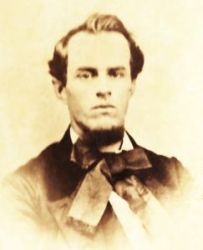 Corporal John Whipple, Jr. left New Boston on his 27th birthday to join the 11th New Hampshire Volunteers.
Corporal John Whipple, Jr. left New Boston on his 27th birthday to join the 11th New Hampshire Volunteers. Taken prisoner at the siege of Knoxville, Tennessee on November of 1863, Corporal Whipple died in the infamous Andersonville Prison, Georgia, in June of 1864.
John Whipple, Jr. was the eldest brother of Joseph Reed Whipple, who later built the Valley View Farm in New Boston and owned hotels in Boston, MA. (See About the Farm.)
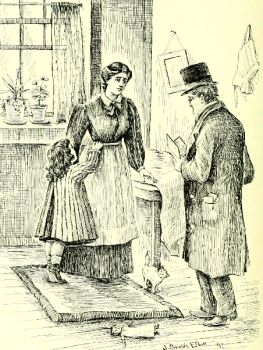 The 16th Regiment New Hampshire Volunteers was stationed in Louisiana and suffered much hardship, especially from malaria.
The 16th Regiment New Hampshire Volunteers was stationed in Louisiana and suffered much hardship, especially from malaria. The 16th Regiment, including 24 New Boston men, left Concord NH in November 1862 and was taken by steamship from Boston to New York City to New Orleans. Ten of these 24 men died of disease; none died from wounds.
(Note that of the 700,000 soldiers from the North and the South who died in the Civil War, about two thirds died from disease. Two of the three gravestones at the top of this page are for New Boston men of the 16th who died of disease in Louisiana.)
The drawing to the right from "The History of the Sixteenth Regiment, New Hampshire Volunteers" (1897) is titled "The Wife Whose Husband did not Return with the Regiment".
The 18th N.H. Regiment served guard duty in Washington D.C. in 1865 during the trial of President Lincoln's assassins. One of the men of the 18th, Andrew T. Nudd, was only 15 years old. Andrew was born in Loudon, NH but was "credited to New Boston" and was a drummer.

"Soldier, rest, thy warfare is over."
Inscription on grave of George C. Andrews, who died September 6, 1863, age 19.
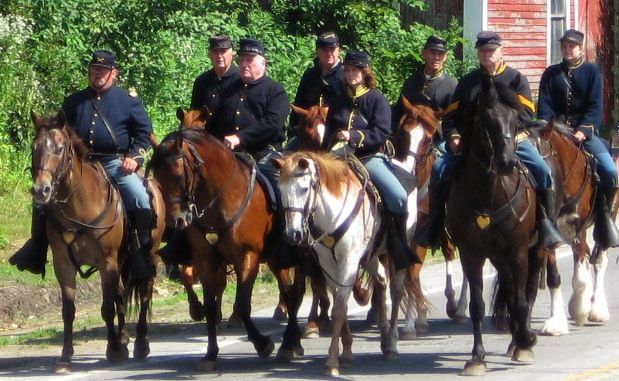
The 1st New Hampshire Cavalry in New Boston - July 4, 2012.
Would you like to see cavalry, artillery and infantry in action? There will be a Civil War encampment on the ballfield behind the New Boston Town Hall on May 10-11, 2013. Also, the Historical Society is displaying a special Civil War exhibit throughout the summer of 2013. Highlights may be seen on our Daily Life of a Civil War Soldier page.
